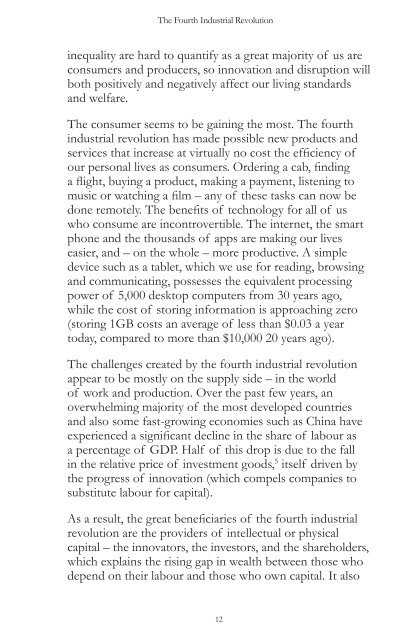The Fourth Industrial Revolution
WEF_The_Fourth_Industrial_Revolution
WEF_The_Fourth_Industrial_Revolution
You also want an ePaper? Increase the reach of your titles
YUMPU automatically turns print PDFs into web optimized ePapers that Google loves.
<strong>The</strong> <strong>Fourth</strong> <strong>Industrial</strong> <strong>Revolution</strong><br />
inequality are hard to quantify as a great majority of us are<br />
consumers and producers, so innovation and disruption will<br />
both positively and negatively affect our living standards<br />
and welfare.<br />
<strong>The</strong> consumer seems to be gaining the most. <strong>The</strong> fourth<br />
industrial revolution has made possible new products and<br />
services that increase at virtually no cost the efficiency of<br />
our personal lives as consumers. Ordering a cab, finding<br />
a flight, buying a product, making a payment, listening to<br />
music or watching a film – any of these tasks can now be<br />
done remotely. <strong>The</strong> benefits of technology for all of us<br />
who consume are incontrovertible. <strong>The</strong> internet, the smart<br />
phone and the thousands of apps are making our lives<br />
easier, and – on the whole – more productive. A simple<br />
device such as a tablet, which we use for reading, browsing<br />
and communicating, possesses the equivalent processing<br />
power of 5,000 desktop computers from 30 years ago,<br />
while the cost of storing information is approaching zero<br />
(storing 1GB costs an average of less than $0.03 a year<br />
today, compared to more than $10,000 20 years ago).<br />
<strong>The</strong> challenges created by the fourth industrial revolution<br />
appear to be mostly on the supply side – in the world<br />
of work and production. Over the past few years, an<br />
overwhelming majority of the most developed countries<br />
and also some fast-growing economies such as China have<br />
experienced a significant decline in the share of labour as<br />
a percentage of GDP. Half of this drop is due to the fall<br />
in the relative price of investment goods, 5 itself driven by<br />
the progress of innovation (which compels companies to<br />
substitute labour for capital).<br />
As a result, the great beneficiaries of the fourth industrial<br />
revolution are the providers of intellectual or physical<br />
capital – the innovators, the investors, and the shareholders,<br />
which explains the rising gap in wealth between those who<br />
depend on their labour and those who own capital. It also<br />
12


